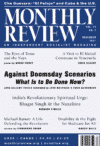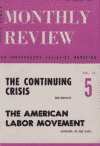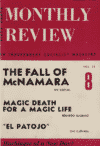Movements
The Cuban Revolution cannot disintegrate because it was never made of meringue. Not because it has not been sweet, but because the revolution has also tasted bitter fruits that, to date, we have known how to turn into strengths. | more…

Young Cuban Voices on the July 11 Events
On Sunday, July 11, 2021, demonstrations occurred in various parts of Cuba. Many of the demonstrators went onto the streets to protest the frequent prolonged power outages in various locations, shortages of food and medicine, and the general precariousness of daily life. A variety of different perspectives are putting their own spin on these events. | more…

Reflections on the Eighth Party Congress
The Eighth Congress of the Communist Party of Cuba—held from April 16 to 19, 2021—offers salient questions, issues, and other themes of the current reality of Cuba from the view of revolutionary militants. Let us take heed. | more…

Despite Cuba’s advantages—its free, universal public health system and its capacity for rapid scientific development, which put it at the forefront in research and vaccine production globally—it was unable to escape the pandemic’s blows. | more…

With the rapidly worsening capitalist demolition of the planetary environment and the expansion of ecosocialist movements in response, leading establishment think tanks, like the corporate-supported Breakthrough Institute, dedicated to promoting the ideology of “green capitalism” at any cost, have found themselves in a difficult place. | more…

We should avoid offering a fatalistic worldview. In fact, the environmental movement in general and ecosocialism in particular are all about combating the current trend toward ecological destruction. Climate change is now “code red for humanity.” This is not a doomsday forecast but a call to action. | more…

Bhagat Singh is an iconic figure of the radical left tradition in India. If Singh, killed in the resistance to British colonialism, were to return from the dead, would he feel that the India of today, brought about by its ruling classes and their political representatives, was really worth his and his comrades’ martyrdom? | more…

El Maizal’s flag-waving communards are rapidly breaking down skepticism about the viability of leader Ángel Prado’s election campaign, for it is undeniable that they are among the reddest elements in the so-called Pink Tide. | more…

The sick and disabled need true co-conspirators who hold politicians accountable, who value the sick and disabled as expert strategists speaking to the needs of the community; who understand and amplify our urgency and our anger. We need universal, single-payer health care—comprehensive care for all, regardless of income or health status—now. | more…

There are a thousand ways to be a radical lawyer. Michael Ratner’s magnificent Moving the Bar gives a tantalizing taste of how one person, with his increasing band of colleagues, defended movements for social justice and revolution during his lifetime. | more…

This exchange appeared in the September 1961 issue of Monthly Review. The questions were submitted, in writing, to Comandante Guevara by Leo Huberman during the week of the Bay of Pigs invasion; the answers were received at the end of June. | more…

A few days ago, a cable brought the news of the death of some Guatemalan patriots, among them Julio Roberto Cáceres Valle. In this difficult job of a revolutionary, in the midst of class wars which are convulsing the entire continent, death is a frequent accident. But the death of a friend, a comrade during difficult hours and a sharer in dreams of better times, is always painful for the person who receives the news, and Julio Roberto was a great friend. | more…










